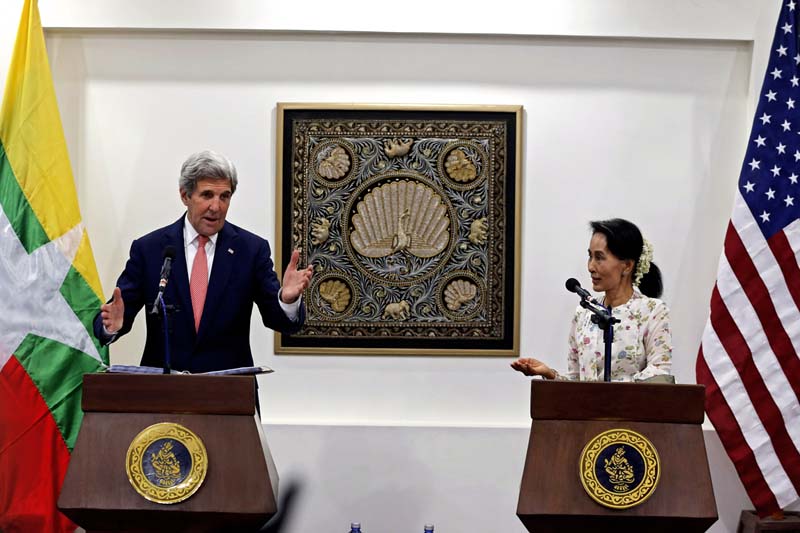Suu Kyi calls for 'space' as Kerry presses her on Myanmar's Rohingya
NAYPYITAW: Myanmar's Aung San Suu Kyi asked to be given "enough space" to address the plight of her country's Rohingya Muslim population, as visiting US Secretary of State John Kerry pressed the Nobel laureate to promote respect for human rights.
Some 125,000 Rohingya in Myanmar remain displaced and face severe travel restrictions in camps since fighting erupted in Rakhine State between the country's Buddhists and Muslims in 2012. Thousands have fled persecution and poverty.
The United States has long supported Suu Kyi's role in championing democratic change in Myanmar, but was surprised this month when she suggested to the new US ambassador Scot Marciel to refrain from using the term Rohingya for the persecuted Muslim minority.
"Emotive terms make it very difficult for us to find a peaceful and sensible resolution to our problems," Suu Kyi told reporters at a joint news conference with Kerry in Naypyitaw on Sunday.
"All that we are asking is that people should be aware of the difficulties we are facing and to give us enough space to solve all our problems."
Kerry said he had discussed the Rohingya issue with Suu Kyi during their meeting, describing it as "very sensitive" and "divisive."
"I know it arises strong passions here," Kerry said. "What is critical to focus on is solving the problem...which is improving the situation on the ground, to promote development, promote respect for human rights and benefit all of those that live in Rakhine and throughout Myanmar."
Last month hundreds of demonstrators protested in front of the US Embassy in Yangon in objection to the use of the term Rohingya in a statement issued by the embassy.
Speaking out for the group would carry a political cost for Suu Kyi, who took on the newly created role of state counselor in April following the first-democratically elected government in some five decades.
The Rohingya are widely disliked in Myanmar, including by some within Suu Kyi's party and its supporters. She risks losing support by taking up the cause of the beleaguered minority.
The Rohingya, most of whom live in apartheid-like conditions, are seen by many Myanmar Buddhists as illegal immigrants from Bangladesh and referred to by many as Bengalis.
Ambassador Marciel has said he would keep using the term Rohingya because it is Washington's policy to do so.
"What we want to do is avoid any terms that just add fuel to the fire," Suu Kyi said in response to a question on her comments about the Rohingya.
"I wasn't talking about one particular term, I was talking about all the terms that are incendiary and which create greater divisions in the Rakhine and of course elsewhere too."
Kerry was on a brief stop in the capital Naypyitaw before he joins President Barack Obama in Vietnam on Monday.
IMPORTANT HURDLES
Kerry offered US support for Myanmar's new government, but said there were still "important hurdles" for the country to overcome in its transition to full democracy from military rule.
He said he would discuss further political reforms in a meeting later with the commander in chief of the armed forces, Senior General Min Aung Hlaing.
Last week, the Obama administration further eased economic and financial sanctions against Myanmar, removing some state-owned banks and enterprises from a blacklist. It also lifted some restrictions on trade to ease concerns of US firms about doing business in Myanmar.
More than 100 individuals and groups remain on Washington's sanctions blacklist for Myanmar, making them radioactive to the international community and barring US banks or companies from making deals with them.
Kerry said the easing of the sanctions was tied to progress made in the democratic process and further easing would not occur under the current constitution, which bars Suu Kyi from becoming president.






